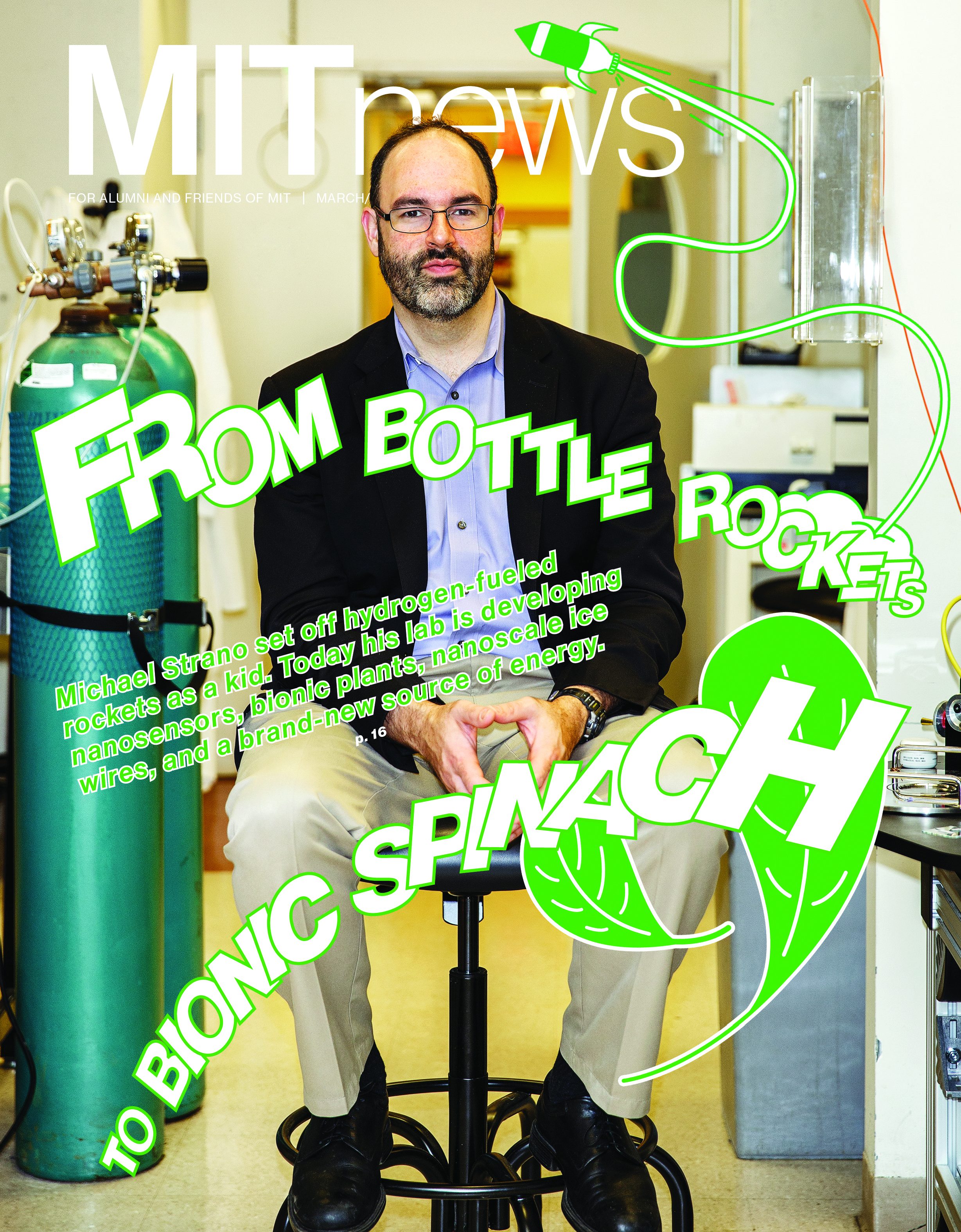Alumni Letters

Strano’s Bold Vision
Talking plants may seem like the realm of science fiction or children’s books, but work by the Strano group is making this a reality (“From Bottle Rockets to Bionic Spinach,” March/April 2017). Using new types of chemical sensors, Professor Strano is engineering plants to respond in ways that can be detected in vivo and even from afar. The potential value of such sensors is tremendous—for science, in terms of in vivo reporting on physiological parameters; for society, in terms of reporting on chemicals in the environment. Strano’s bold vision opens the door to a type of manipulation that hasn’t yet been tried in plants. Bomb-sniffing tulips? Stay tuned.
N. Michele Holbrook
Charles Bullard Professor of Forestry, Harvard University
Cambridge, Massachusetts
Bridging the Political Divide
Professor Haslanger argues persuasively that America’s political divides cannot be bridged unless we collectively work toward coördinating social narratives that are “just and accurate” (“Why ‘Make America Great Again’ Won Out Over ‘Stronger Together,’” March/April 2017).
She also notes a major challenge: proponents of the progressive narratives that have “disrupted” established narratives sometimes fall back on the older ones when it is convenient, thus breeding cynicism among those who are skeptical about the new. In particular, Haslanger suggests that Hillary Clinton’s endorsement of the “bad boy” narrative to justify her husband’s behavior undermined support for the claim that women are equal to men in power and prestige.
But the challenges associated with coördinating Americans on the basis of progressive narratives go beyond keeping disciplined in sticking to them. Since (as Haslanger notes) all narratives are simplistic, it is important that proponents of any narrative be open about its inherent limits. Consider, for example, the failure by many pro-choice activists to appreciate the widespread feeling that abortion is a tragedy. And consider the pitched battle being waged between some feminists and trans activists over how womanhood should be defined. In short, any narrative is problematic if stretched too far, and any such stretching tends to mask inner contradictions.
Haslanger observes that simplifying narratives are necessary, especially when socializing children, and she encourages us to aim for narratives that are as “just and accurate” as possible. This sounds right to me. But we must aim even higher. We must pursue a “grown-up” discourse, one that recognizes that life is not so simple, and that people of good will can have honest disagreements about how to balance competing values.
Ezra Zuckerman Sivan
Professor of Strategy and Entrepreneurship and Deputy Dean, Sloan School of Management
Cambridge, Massachusetts
I stopped reading the Harvard alumni magazine because its content got overly politicized and heavy-handed. I hope I don’t have to do the same with my undergrad magazine. Professor Haslanger’s article is a case in point. Outside of her working for the ’Tute, the article has little relevance to either MIT or technology. Moreover, the argument has been made many times before. An article like this is worthwhile in the New York Times (where I have read several), or the Huffington Post (where I have noted many), but not in Technology Review.
I recognize that Haslanger’s line of thought is likely quite important to the editors and staff of the magazine, as it is to everyone I know in media. But it’s important you stay within your core competency. I do not read Tech Review for a feminist slant on national politics, and I’m sure few others do.
Burt Rothberg ’68
Princeton, New Jersey
Editor’s note:
The “core competency” of MIT Technology Review’s MIT News section is showcasing the work of the MIT community, whose research is not limited to technology. MIT’s School of Humanities, Arts, and Social Sciences (on whose faculty Sally Haslanger, the Ford Professor of Philosophy, serves) houses world-renowned graduate programs, and its research helps alleviate poverty, safeguard elections, steer economies, assess the impact of new technologies, inform policy on issues ranging from energy and climate to economic equity, and more. SHASS also serves the critical function of helping MIT students become well-rounded thinkers. As President L. Rafael Reif has observed, “Humanity faces urgent challenges—challenges whose solutions depend on marrying advanced technical and scientific capabilities with a deep understanding of the world’s political, cultural, and economic complexities.”
Tell us what you think
E-mail mitnews@technologyreview.com
Write MIT News, One Main Street, 13th Floor, Cambridge, MA, 02142
Keep Reading
Most Popular
Large language models can do jaw-dropping things. But nobody knows exactly why.
And that's a problem. Figuring it out is one of the biggest scientific puzzles of our time and a crucial step towards controlling more powerful future models.
The problem with plug-in hybrids? Their drivers.
Plug-in hybrids are often sold as a transition to EVs, but new data from Europe shows we’re still underestimating the emissions they produce.
Google DeepMind’s new generative model makes Super Mario–like games from scratch
Genie learns how to control games by watching hours and hours of video. It could help train next-gen robots too.
How scientists traced a mysterious covid case back to six toilets
When wastewater surveillance turns into a hunt for a single infected individual, the ethics get tricky.
Stay connected
Get the latest updates from
MIT Technology Review
Discover special offers, top stories, upcoming events, and more.